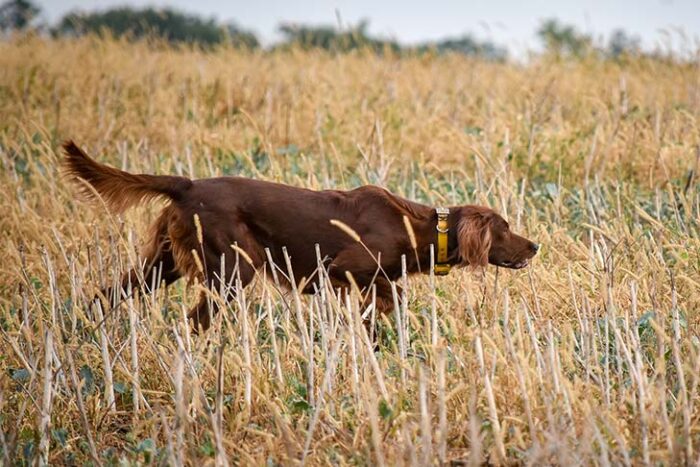Irish Setters are a beloved and beautiful dog breed known for their mahogany or chestnut red coats and friendly, playful personalities. However, they are also an energetic and hyperactive breed that needs plenty of exercise and training to prevent problem behaviors. As puppies and young dogs, Irish Setters can be extremely hyper, constantly running, jumping, and getting into mischief. Without proper outlets for their energy, this hyperactivity and exuberance can turn into undesirable behaviors like destructiveness, excessive barking, aggression, anxiety and more. Luckily, with time, patience and the right approach, you can manage your Irish Setter’s hyperactivity. In this article we talk about Managing Hyperactivity in Irish Setters-Exercise and Training Tips.
Table of Contents
The Importance of Exercise

Getting your Irish Setter adequate daily exercise is the foundation for managing hyperactivity and preventing associated behavior problems. This athletic sporting breed was developed to have great stamina and energy for all-day excursions hunting game and needs vigorous activity on a daily basis. Young Irish Setters under 18 months especially require a minimum of 90 minutes of heart-pumping exercise and play per day. This can be achieved through activities like running alongside a bike, playing fetch and frisbee, swimming, hiking on leash, socialization at the dog park and more. Without this outlet, your Irish Setter will become restless, destructive and hyper. Make sure walks are brisk-paced and include playing, running and training. Mentally stimulating your dog through obedience work, scent games and food puzzle toys will also help wear them out.
Leash Training
One of the keys to preventing hyperactivity is ensuring your Irish Setter gets adequate exercise daily. However, this energetic breed has a tendency to take off running and exploring given the chance. Proper leash training is essential for maintaining control on your walks and hikes. Invest in a comfortable, sturdy 6 foot leash and flat buckle collar or front-clip harness like an Easy Walk. Begin training from a very young age not to pull or lunge. Use treats and praise to reward and reinforce your dog walking properly by your side without tension on the leash. If they begin to pull, immediately stop walking until there is slack again on the lead. With consistency, patience and the right equipment, you can master loose leash walking. This will allow you to exercise your dog safely and prevent escapes.
Mental Stimulation
In additional to physical activity, Irish Setters thrive when given regular mental stimulation. Bored, under-stimulated dogs are more likely to act out and be hyper. Give your dog plenty of interactive toys that challenge their problem solving skills and satisfy their curiosity like food puzzle toys, Kongs stuffed with treats or food dispensing balls. Do short 5-15 minute training sessions daily working on basic cues and tricks to engage their minds. You can also enrich their environment with new, rotating toys, hiding kibble around the house for them to seek out or getting food dispensing toys. A mentally tired dog will be less hyper and calmer in the home.
Impulse Control Training
A major component of hyperactivity in Irish Setters is lack of impulse control. They tend to react on instinct without first thinking. Obedience training and impulse control games are essential for teaching them to control their initial impulses, wait for direction from you, and respond appropriately despite distractions around them. Work on cues like Wait, Leave It and Come which force them to control their reactions and follow your commands. You can practice impulse control by having them wait politely before meals, doors and gates instead of rushing ahead. Require a Sit before giving affection or throwing toys. Gradually increase distractions and proof these skills in real-world scenarios. Mastering impulse cues will help minimize hyper behavior like door dashing, jumping on guests, pulling on walks and more.
Crate Training
One excellent way to manage your Irish Setter’s hyperactivity when you are unable to directly supervise is through crate training. Contrary to popular belief, crates are not cruel if introduced positively and never used punitively. The crate should be a place of comfort, security and rest. Make it cozy with a bed and toys, use treats to reward entering voluntarily, and provide all meals inside. When you cannot actively engage, exercise or train your Irish Setter puppy, place them in the crate for a nap or while you are occupied. This will prevent inappropriate chewing, accidents and hyper behavior in the home. Puppies should not be crated longer than 2-4 hours at a time. Make sure your dog is well-exercised before and after any crating periods.
Seek Expert Guidance
Managing hyperactivity in an Irish Setter can be challenging, especially for first-time owners. Seek out professional training classes starting as young as 8 weeks old to get expert guidance tailored to your breed. Look for trainers who use reward-based methods and have experience with other sporting and hunting breeds. They can help you establish rules, boundaries and structure while meeting your dog’s needs. Private lessons, group classes and even board and train programs are great options for both puppies and adult dogs needing help with impulse control, manners and obedience skills. Investing in professional help prevents and resolves behavior issues.
With their playful, affectionate personalities and stunning good looks, the Irish Setter makes a wonderful family pet for active homes. However, their high energy, excitability and tendency towards hyperactivity require an experienced owner committed to providing adequate outlets and training. By following these exercise, enrichment and training tips, you can manage problematic hyper behavior and have a well-adjusted, happy Irish Setter as part of your family. Put in the effort to meet their needs, be patient and consistent with training, and seek help from professionals if needed. Your efforts will pay off with a calm, obedient and loving companion by your side for years to come. I sincerely hope you find this “Managing Hyperactivity in Irish Setters-Exercise and Training Tips” article helpful.

Dr. Kate Bruce is a highly experienced veterinarian with a Master’s degree in Veterinary Medicine and over a decade of expertise in animal behavior and holistic pet care. She combines traditional and modern practices to offer exceptional advice on pet health and wellness. Explore more at petsconsultancy.com and follow her on Instagram for expert tips.









